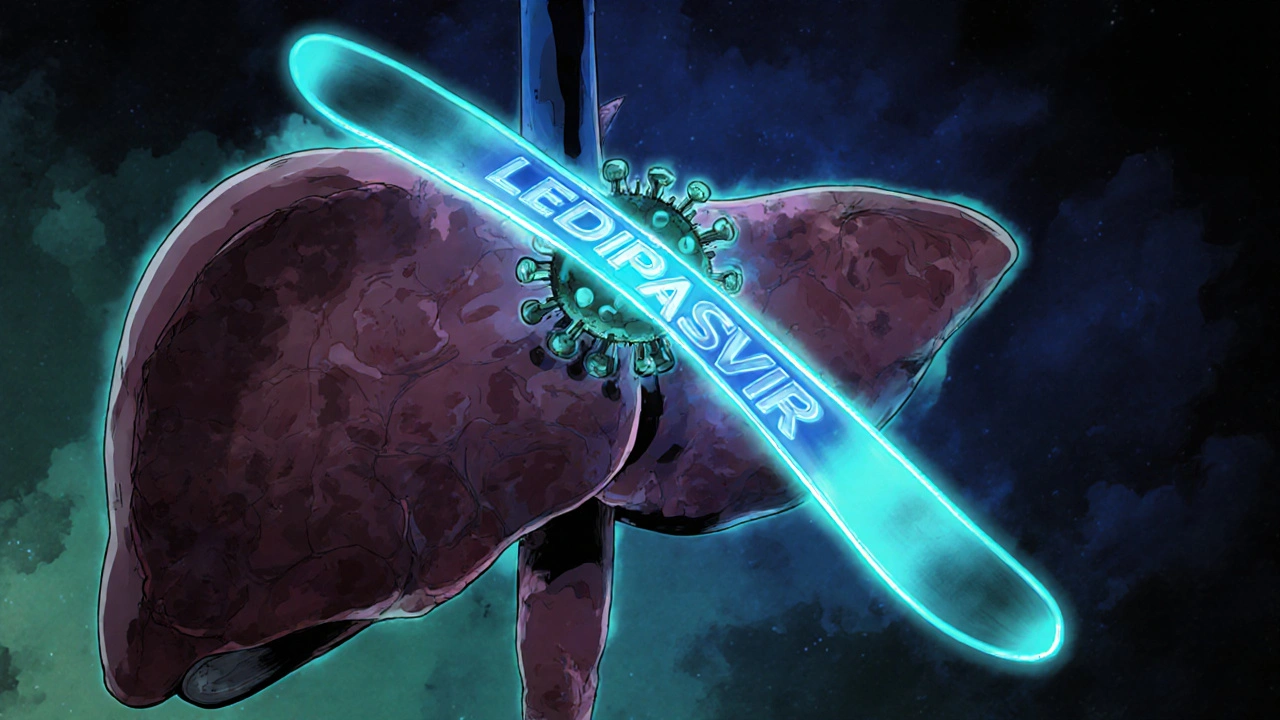HCV Treatment Duration Calculator
Treatment Duration Calculator
Select patient characteristics to determine recommended treatment duration for Ledipasvir/Sofosbuvir (Harvoni) regimens.
Recommended Treatment Plan
Duration:
Regimen: Ledipasvir/Sofosbuvir (Harvoni)
When it comes to curing hepatitis C, Ledipasvir is an NS5A inhibitor that blocks a crucial step in the virus’s life cycle. Paired with Sofosbuvir, it forms the once‑daily pill Harvoni that reshaped treatment guidelines worldwide. This article walks you through why Ledipasvir matters, how it fits into combination regimens, and what clinicians and patients should know in 2025.
What Is Ledipasvir and How Does It Work?
Ledipasvir belongs to the class of NS5A inhibitors, a group of direct‑acting antivirals (DAAs) that latch onto the NS5A protein of the hepatitis C virus (HCV). By preventing NS5A from binding to the viral RNA, Ledipasvir halts the assembly of new virions, effectively stopping the infection from spreading inside the liver.
In contrast to older interferon‑based therapies, which relied on boosting the immune response, Ledipasvir directly targets the virus, leading to faster viral clearance and fewer side effects.
Key Clinical Evidence Behind Ledipasvir‑Based Regimens
The pivotal ION‑1, ION‑2, and ION‑3 trials enrolled over 4,000 patients with genotype 1 HCV, the most prevalent strain in the United States and Europe. Across these studies, the ledipasvir/sofosbuvir combo achieved a sustained virologic response (SVR) - essentially a cure - in 94‑99% of participants after just 8-12 weeks of treatment.
- SVR12 rates were 99% in treatment‑naïve patients without cirrhosis (ION‑3).
- Even patients with compensated cirrhosis reached 96% SVR12 (ION‑1).
- Patients who had previously failed a DAA regimen still achieved 93% SVR with a 24‑week course.
These outcomes earned the U.S. FDA approval in October 2014 and set the benchmark for all‑oral, interferon‑free HCV therapy.
Why Combine Ledipasvir with Sofosbuvir?
Sofosbuvir is an NS5B polymerase inhibitor that stops the virus from copying its RNA. When you pair an NS5A blocker (Ledipasvir) with an NS5B blocker (Sofosbuvir), you attack the virus on two fronts, drastically reducing the chance of resistance.
The fixed‑dose combination Harvoni (Ledipasvir/Sofosbuvir) was the first all‑oral regimen approved for genotype 1, 4, 5, and 6 patients, allowing once‑daily dosing without the need for ribavirin or interferon.

How Ledipasvir Fits Into the Current HCV Treatment Landscape
Since 2015, several newer DAAs have entered the market, such as Velpatasvir, Glecaprevir, and Pibrentasvir. To help clinicians choose the right regimen, the following table compares the most common combos.
| Regimen | Targeted Genotypes | Typical Duration | SVR12 Rate (GT1) | Key Advantage |
|---|---|---|---|---|
| Harvoni (Ledipasvir/Sofosbuvir) | 1, 4, 5, 6 | 8-12 weeks | 96‑99% | Single‑pill, no ribavirin |
| Epclusa (Sofosbuvir/Velpatasvir) | All genotypes (pangenotypic) | 12 weeks | 95‑98% | True pangenotype coverage |
| Mavyret (Glecaprevir/Pibrentasvir) | All genotypes | 8 weeks (12 weeks for cirrhosis) | 94‑98% | Shortest course for some cirrhotics |
| Elbasvir/Grazoprevir | 1, 4, 6 | 12 weeks | 93‑97% | Effective in patients with renal impairment |
Even with newer options, Harvoni remains a go‑to regimen for genotype 1 patients without advanced liver disease because of its simplicity and extensive real‑world safety data.
Safety Profile, Side Effects, and Drug Interactions
Ledipasvir is generally well‑tolerated. The most frequently reported adverse events (≥5% incidence) are headache, fatigue, and nausea, usually mild and transient.
Because Ledipasvir is a substrate of the transporter P‑gp and the enzyme CYP3A4, it can interact with strong inducers (e.g., rifampin, carbamazepine) or inhibitors (e.g., ketoconazole). Such drugs can raise Ledipasvir levels, increasing the risk of hepatic toxicity. Clinicians should review a patient’s medication list before prescribing.
Patients with moderate to severe hepatic impairment (Child‑Pugh B or C) are not recommended to use Ledipasvir‑based therapy due to limited data.
Special Populations: Resistance, Pregnancy, and Co‑Infections
Resistance‑associated substitutions (RASs) in NS5A can reduce the efficacy of Ledipasvir, especially in genotype 1a patients with prior DAA failure. Baseline testing for NS5A RASs is advised when retreating such individuals; extending therapy to 24 weeks or adding ribavirin can overcome reduced susceptibility.
Current guidelines advise against using Ledipasvir during pregnancy because safety data are limited, though the drug’s category B rating suggests low teratogenic risk. Breast‑feeding mothers should also avoid exposure due to unknown infant effects.
For patients co‑infected with HIV, Ledipasvir/Sofosbuvir remains effective and does not interact significantly with most antiretroviral agents, making it a preferred choice.

Practical Prescribing Guide: Dosing, Duration, and Monitoring
- Start with a once‑daily tablet containing 90 mg Ledipasvir and 400 mg Sofosbuvir.
- Determine treatment length based on genotype, presence of cirrhosis, and prior therapy:
- Genotype 1, no cirrhosis, treatment‑naïve → 8 weeks.
- Genotype 1 with compensated cirrhosis → 12 weeks.
- Prior DAA failure → 12-24 weeks, consider adding ribavirin.
- Baseline labs: HCV RNA, liver panel, renal function, hemoglobin.
- Follow‑up at week 4 to assess adherence and side effects; repeat HCV RNA at end of treatment and 12 weeks post‑therapy to confirm SVR.
- Educate patients on avoiding P‑gp inducers and to report any new medications immediately.
Adherence is critical; missing more than two doses can jeopardize cure rates.
Future Outlook: Where Is Ledipasvir Heading?
By 2025, the global HCV elimination goal set by WHO pushes for broader access to affordable DAAs. Generic ledipasvir‑based combos are now available in many low‑ and middle‑income countries, driving down costs to under $100 per 12‑week course.
Research continues into shorter, ribavirin‑free regimens and pan‑genotypic options that could eventually replace ledipasvir for certain populations. Until then, its track record of high SVR, tolerability, and simplicity ensures it stays a cornerstone of HCV care.
Frequently Asked Questions
Can I take Ledipasvir with alcohol?
Moderate alcohol use does not reduce the effectiveness of Ledipasvir, but heavy drinking can worsen liver damage. Patients are advised to limit alcohol while on therapy.
Do I need a liver biopsy before starting treatment?
No. Non‑invasive fibrosis assessments (FibroScan, APRI score) are sufficient to determine cirrhosis status for dosing decisions.
What if I miss a dose?
Take the missed tablet as soon as you remember, unless it’s close to the next scheduled dose. Then skip the missed one and continue regular dosing. Do not double up.
Is Ledipasvir safe for patients with kidney disease?
Yes. Ledipasvir/Sofosbuvir does not require dose adjustment in mild to moderate renal impairment. Severe (eGFR < 30 ml/min) patients should be evaluated on a case‑by‑case basis.
How soon after finishing therapy will my doctor confirm cure?
A blood test 12 weeks post‑treatment (SVR12) is the standard benchmark for cure. Some clinicians also check at 24 weeks for added certainty.











Natalie Morgan
20 Oct 2025 at 21:38Ledipasvir’s high cure rates really changed the game for patients who were scared of interferon. The once‑daily Harvoni simplifies adherence, especially for those juggling work and family.